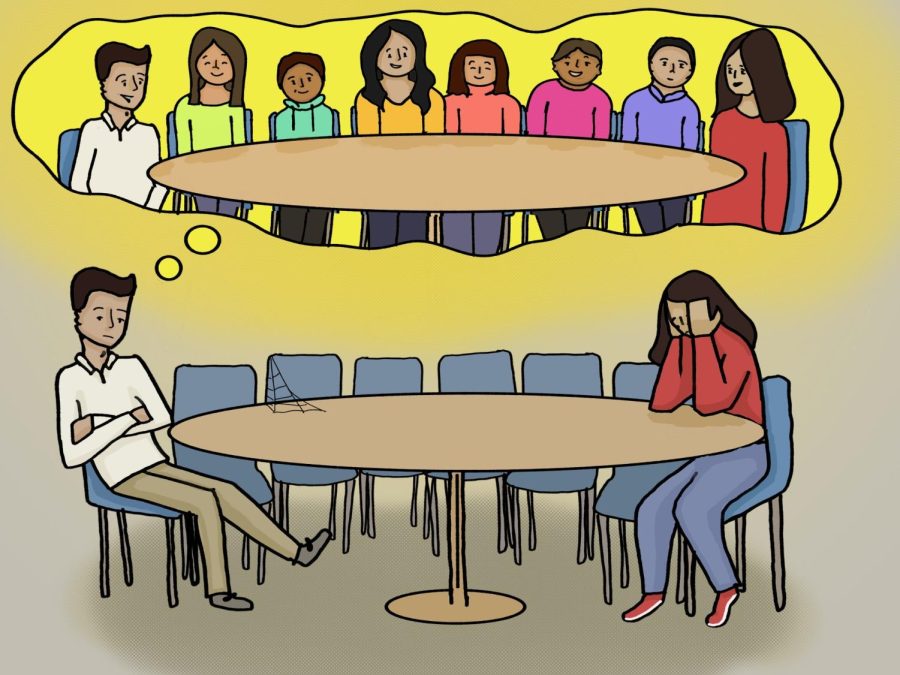CAMPUS: SCHS clubs seek to rekindle the flame of activity on campus
Upon the return to in-person learning, SCHS clubs have been navigating through the challenges of rekindling activity and engagement. To ensure the success of these clubs, the Associated Student Body and Leadership Council are actively implementing new systems for support, and many clubs have found an increase in engagement due to the updated systems.
Starting from the 2018-2019 school year, the evolution of club check-ins has changed from a manual paper-based process containing 70 Google Drive folders and a Google Classroom. Noticing the inactivity of clubs in the 2021-2022 school year, senior ASB Vice President Cole McColloch earned approval for an idea by administration for clubs to submit a club report on Google Classroom entailing a status update, attendance records and meeting minutes.
“My main solution is to make this whole process easier and efficient to take less work off of club presidents so they can focus on the important part of engaging members, focusing on productive meetings and trying to figure out a successful system that works for them,” McColloch said. “Instead, I can focus on talking directly to club leaders and asking them what they need to focus more on supporting clubs.”
Clubs that neglect to submit a club report for two consecutive months will have their charter terminated. In order to better organize tracking active and inactive clubs, junior Secretary/Treasurer Cydney Ventura has been leading the effort to create a new club website.
“I have taken on the responsibility of creating the new club website, and overall it has really strengthened my relationship with the club community,” Ventura said. “It is also a place to help combat inactivity and increase club membership. The school website is hard to regularly update for all the changing clubs, so hopefully by next school year we can implement this system for all clubs to have a website page.”
COVID-19 deepened the struggle for many clubs to maintain strong member and officer activity. Senior Filipinx American Student Association Vice President Aceben Agustin reflected on how the long-standing club has been battling the post-effects of the pandemic.
“Compared to the beginning of the school year, we had to use the school gym to hold the meeting with how many members showed up, and it was amazing having so many people interested and involved,” Agustin said. “COVID-19 definitely had a role in overall activity in clubs where a lot of people have been feeling burnt out. Due to restrictions, FASA was unable to have a big event to celebrate Filipino History Month inside the theater as they have in past years.”
Recognizing the lack of male presence in the Black Student Union, junior Jamal Howard took initiative to establish Brothers Excelling Together.
“BET is a club dedicated to engaging and uniting more Black men to come out and teach them life skills to be successful,” Howard said. “I wanted to create a space where my brothers can excel in this community and uplift each other’s spirits, and it expands to whoever else needs support.”
Similar to FASA, BET was unable to carry out events that would attract more club members.
“It was hard because we wanted to share food and provide people a new taste in order to get new members interested,” Howard said. “Unfortunately, we couldn’t do it because of COVID guidelines. We had a lot of ideas rejected, so we had to work around them.”
McColloch acknowledged the need for extra support for the underclassmen who have less experience in higher club positions compared to upperclassmen. McColloch applied a term he learned in his history course to illustrate the hardships clubs are facing.
“We’re in the Great Resignation right now. This is a time after COVID where people are reevaluating whether or not they want to do work and if they think it’s worth it,” McColloch said. “People are reevaluating whether they think having a club is worth it.”
Future plans to boost engagement include hosting multiple club faires throughout the year to open options for students. Vice Principal of Activities, Facilities and Communication Sharon Freeman has translated past experience with activities to help improve the quality of student-driven organizations at SCHS.
“The students are the ones making the plans and making the decisions. I’m there to make sure they stay within the parameters of what’s feasible on campus, and I’m able to give some of that outside perspective,” Freeman said. “I’m really excited with how supportive the club advisors are on campus, and they not only open up their rooms, but they are a support and a confidante for the groups.”
Agustin noted the importance of preserving the legacies of cultural clubs, as he sees them as a place to form lifelong friendships with those of similar backgrounds.
“Cultural clubs allow people to learn more about their culture, and for FASA, provide a space for Filipino students to connect with others who grew up under a similar culture and lifestyle,” Agustin said. “For identity, it shines a light to understand someone’s heritage, culture and overall history of both the beauty and hardships experienced by these groups.”
Ventura agrees that the improvement of clubs is vital to fostering an easygoing environment for students.
“The purpose of the club system design was just to make the club process easier, that way it doesn’t discourage any club officers and stop them from being able to show their club’s true potential,” Ventura said. “Clubs are extremely important here at SCHS because it enables students to be able to show off their culture or passions, which they can’t do in normal classroom environments. When people are in a familiar community, they automatically feel more comfortable and accepted.”


